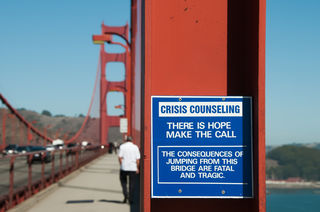Cause for Hope
A better understanding of suicide risk and the protective role of connectedness is emerging.
By Shira Polan published January 3, 2017 - last reviewed on February 13, 2018

A combination of mental pain and hopelessness predicts suicidal thoughts but not necessarily the decision to act on them, researchers have found. "It's important to intervene early," says psychologist David Klonsky of the University of British Columbia. "But it's just as important to block the progression from thoughts to action." A better understanding of suicide risk and the protective role of connectedness points to ways of doing just that.
Extending Lifelines
"Making a connection with one person, even a therapist or clinician, can keep you alive," says Tel Aviv University psychiatrist Gil Zalsman. He cites the finding that patients who received a postcard reminding them to call a 24-hour hotline if they needed help were less likely to attempt suicide. "There is overwhelming evidence that patients will be truthful if asked whether they have suicidal thoughts or feelings," says Mike Hogan, a former New York State Commissioner of Mental Health. Technology can help facilitate these conversations: Online screening in schools could help identify at-risk students who might be reluctant to seek help, and social media and smartphone apps are emerging as potential avenues for support. Recent studies suggest that analyzing risk factors and the words doctors use in patients' health records could help pick out those most in danger.
Creating Obstacles
Mounting evidence confirms the lifesaving potential of interrupting common methods of suicide, essentially doing "anything that makes suicide harder," Klonsky says. Governments can take measures like constructing barriers on bridges and other hotspots or restricting the number of pills sold per bottle. On an individual level, loved ones can try to prevent an at-risk person from accessing dangerous possessions. "People usually decide only a few hours beforehand," Zalsman says. "If they don't have the means in that moment, they may never do it."
Where To Go For Help
Visit: https://www.psychologytoday.com/us/therapists in the US or https://www.psychologytoday.com/gb/counselling in the UK.
Text: START to Crisis Text Line at 741741
Call: the National Suicide Prevention Lifeline at 1-800-273-8255
